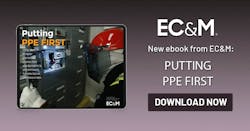Putting PPE First
According to an Electrical Safety Foundation International (ESFI) analysis of 2019 U.S. Bureau of Labor Statistics data, 126 workers experienced fatalities due to electrical-related work, while 2,220 workers experienced nonfatal electrical injuries involving days away from work. Since one of our priorities at EC&M is providing editorial content that keeps our readers on top of the latest safety trends and practices, we've compiled this free e-book with the latest information on how personal protective equipment (PPE) can help reduce the number of injuries and deaths on the job site through safe/effective usage.
This selection includes an article by Hugh Hoagland, independent consultant and safety/arc flash expert, on how to improve electrical safety compliance by up to 40% by pairing proper PPE usage with electrical safety programs. But what does proper PPE usage look like? To answer that question, this e-book covers a wide range of PPE topics, including which gloves meet ASTM F3258 standards, smart PPE, a look back at PPE of the past compared to today's technology, and the most common PPE mistakes.
When addressing PPE, arc flash is a topic that cannot be ignored due to its high risk of injury and fatality. Arc flash PPE can be a life-saving tool for those working around these high-energy blasts, so don't miss the articles on what requirements to expect from arc flash clothing labels and a reminder why electrical workers should never share arc flash PPE.
In addition, Tommy Northcott, one of our most popular contributors, provides an inside look at eight common misconceptions about arc flash that are prevalent in the industry.
The National Fire Protection Association (NFPA) estimates that five to 10 arc flash incidents occur daily, and more than 2,000 people are treated in burn centers with arc-flash injuries annually, according to its 2015 report, so understanding these fallacies and how to confront them can help protect workers' lives.
I know this free e-book will provide a valuable reminder of how to protect workers from arc flash and other hazards through the practical, effective use of PPE.
— Ellie Coggins, Senior Associate Editor
